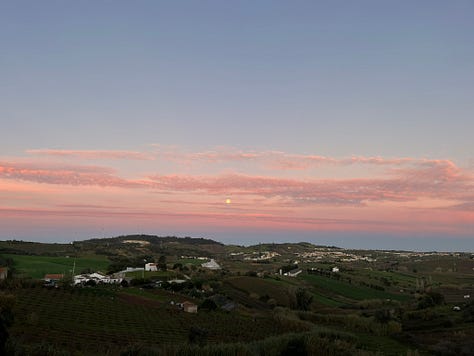Retreat
The pull of retreat took hold this past January in Azueira, a Portugese village of seventy-two people with a dual purpose post-office / coffee shop. Jon flew to San Francisco at the last minute, leaving Kuuma and I with only each other and 20 or so sheep. I was so excited to be alone, and then wasn’t. I didn’t occupy the time in the ways I expected, and felt myself grasping for more and feeling disappointed with what was. There’s been much more work travel (on both our parts) since then, and I’ve found myself frequently reflecting and writing on the idea of retreating from the daily people, places, and routines we habitually inhabit.
The first day of retreat, I revel in being alone. No eyes watching, no claims on my attention. I’ll assemble a stack of books, a cupboard of snacks, and handwritten lists of everything I want to dive into. I’ve been able to immerse myself for hours just daydreaming in quiet distraction since childhood, and these empty spaces feel full of possibility.
But then it creeps in: the loneliness in the quiet, the overwhelm of a busy life built for two on the shoulders of one, the listless feeling of floating outside routine without any clear "purpose" within this liminal space. The pressure and shame I’ll apply on myself for not completing all the things I thought I’d finally have time and focus to do.



During our honeymoon in Sicily, I also found myself in retreat. The heat, the food, the upgraded hotel rooms with panoramic ocean views… it was an invitation to pause the routine: ignore the ankleweights, swap literature out for smut, order pasta (twice), cancel the hiking tour, take a nap. For once, I accomplished nothing but a tan. Jon was slightly more productive, practicing his Italian and charming every local (we arrived home with two family recipes and a kilogram of our sunset sailing skipper’s oregano).
This was a detour from my usual escapism. My retreats are rarely for rest - they're about improvement. The Class retreat to transform mind and body. The Oxford course to build an expert knowledge management system. An RYA Sailing course in Thailand to certify as skipper on Lake Ontario. Always "disappear and emerge improved." Didn’t we all spend our summers practicing our handwriting and perfecting our cartwheels before school started?
Maybe that's why Sicily felt so foreign and delicious.
Wherever you go, there you are
As a “sick kid”, my relationship to seclusion was unquestionably shaped by a series of intense treatment and recovery periods, where any rest or retreat was expected to yield a return on investment. Homeschooled with a feeding tube, I understood that I’d be back for third grade, and able to eat solids (!) if only I endured this brief disappearance from friends and recess. The 6 hours in CHEO every month for infusions was a day trade for more energy and a partial appetite. Every 24 hour fast before a procedure was worth the clarity gained from the scans.
I learned early that you only step back to step further forward.


But I don't think it's just pediatric hospital alumni who feel wary of retreat for "nothing." Pausing progress feels wasteful. We treat action and inaction as opposing forces; positive and negative. Either I’m a productive wifedaughterfriendmanagercolleague, or I’m not. If I’m in retreat, I’m passive, unproductive, not contributing.
This is deeply Western thinking, but Eastern philosophy invites us to hold opposites as complementary aspects of a whole. We hear echoes of this everywhere - it’s your friend exclaiming “both things can be true!” before clinking wine glasses, the pilates trainer telling you to first soften your belly to engage your pelvic floor, the podcast host telling you that to love unconditionally is to set boundaries. We’re constantly reaching for this nonduality in social vernacular, but struggling to live it.
In retreat, if we consider progress and reflection as yang and yin, permeating each other and creating a whole, we can try to see the inaction as a necessary aspect of action. In order to be a force of forward momentum, you must also hold the soft power of withdrawal. But it’s hard to balance the paradox. With the best intentions I will seclude myself to rest… yet wherever I go, there I am. The 8 year old who wants to re-appear better. My plan for how seclusion will feel and what it will produce closes the door to unplanned invitations. I struggle to break from the rigidity of how things should be into a soft receptiveness of what could be.
There are, however, the retreats that I didn’t plan. The ones that quietly drew me into their lessons unsuspectingly. These retreats often choose us instead of being chosen by us, catching us “off guard” not through the usual spook or excitement, but the slow progress of boredom and stillness. It’s the train being delayed on-track for two hours, the day spent sick in bed, or the snow day that halts the city. Or the heat of a honeymoon and the absolute and total crash after a wedding.



You’re making me nervous
This complementary view of retreat being a place to soften to strengthen has become visceral for me lately. My nervous system’s threat response, historically always in full fight, has done a pendulum swing towards flight or freeze. When I turn to flight I literally want to flee to safety, and in freeze I’m in internal retreat: withdrawal from the moment itself.
Where I previously took pride in how well-spoken I was in a debate, my new disinterest in “winning the argument” and tendency towards a psychological retreat - whether physical or mental - is new. Another echo of finding strength in softness. It’s led me to interpret regression or retreat not as maladaptive, but as an active inactivity that allows for healing within.
Often in the aftermath of rupture, if there is a safe and containing space to retreat to, and understanding witnesses to dialogue with, people find themselves in a kind of thoughtful ruminative process in which they have little interest at all in the things that previously engaged them. … In psychoanalytic theory, the process has been called ‘regression’ and is believed to be central to healing. Here regression does not signify a return to a childhood or infantile state, it indicates a stepping back from busy or manic doing toward a slower more reflective stance… regression is the moment in which one can find a pace to mourn, to ‘abandon invulnerability and to become a sufferer’ (Watkins & Shulman, Towards Psychologies of Liberation)
I’ve spent 34 years “pulling up my boots” or “putting on my big girl pants”. Getting dressed against the storm of feelings, bundling up to shelter from vulnerability. I can hardly remember inhabiting a feeling without being there for the sole purpose of fixing it. So what does healthy regression in rupture look like? Lately it’s just been me saying “I’m sad” with a shrug, continuing to wipe the counters or log into Zoom or leave the room to one without a fruit fly infestation. And just letting that be for now.
In the more heated moments (with some success) I’ve started to ask myself “what would retreat look like right now?” when I notice disregulation. It’s a more generous interpretation on my urge to flee, and helps me consider my retreat not as a step backwards, but as a step into a healing space. It might mean physical retreat, but sometimes it's changing my posture and occupying my current space differently. Sometimes it's just internally saying 'I don't need to solve this right now’ or ‘I’ll come back to this in a few hours’. A retreat can span days, but it can also span seconds or minutes, when you need it.
✨ bonus tip: if you’re prone to physical retreat, but often take flight just to find you’re having a nervy b on the sidewalk: ask the other person to leave. This was revelatory for us. I self-regulate better in my own home, and Jon’s more than happy to go on a wee stroll and give me space ✨
The call is coming from inside the house
I told my therapist I think I needed Ritalin earlier this year, because how the fuck is anyone focusing on anything these days. War is everywhere, America’s ICE budget is bigger than most global militaries, planes are falling from the sky, Canada’s “life saving aid” to Palestine is also (embarassingly) falling from the sky, and David Suzuki himself has said “it’s too late” to win against climate change.
Her reply: "Sure, maybe you have ADHD. Or not. Regardless, your environment is still engineered to exploit your attention." As in: if I have ADHD I should certainly explore medications to help, but even if not, why don’t we should explore how I’m experiencing the world’s grip on my focus.
Isn’t it the same for everyone? Diagnosis or not, the environment we’re in has been engineered to overwhelm our attention. I’m directly inside the world of ~ user experience ~ and can faithfully tell you that every company is designing addiction into the interface. Products designed to seize attention increase ad revenue, data collection, and user retention are all increasing shareholder value. We’re facing direct financial incentives and executive bonuses measured by engagement metrics AKA how glued you are to screens. What do you reckon they’re optimising for?
Why do you reckon so many of us are so desperate for retreat, and then paralysed once we have it?
One page at a time
Don’t panic, unlock your pupils from a screen, and try a book. It’s okay to seek regression, remember? Anyone who knows me will not be surprised that my primary and most beloved retreat is literary transportation. If you need your next book, and are keen to explore the sense (and multitudes) of retreat through fiction, there’s:
If you’re interested in a non-fiction examination of retreat, there is an equally wide range of options:
Tricia Hersey's Rest is Resistance frames napping and daydreaming as radical acts, rooted in Black womanist thought.
Jenny Odell's How to Do Nothing argues that refusing productivity demands is not only personal salvation, but political resistance.
Korean philosopher Byung-Chul Han writes about The Burnout Society, and how excessive positivity and universal availability create social exhaustion.
Cal Newport's Digital Minimalism appeals to the more practical of us, and offers concrete strategies for reclaiming your attention from the tech designed to steal it.
You have no idea
In my wedding vows, I focused on the promise of not knowing: the ongoing and curious conversation within marriage that doesn't feign fixedness, and the intimacy of carrying on in uncertainty. Cleaving into the transitions.
I think, in anticipation and excitement of my retreats, I burden them with “knowing” - what will be good, what will be useful, what will make it enjoyable - and rob myself of the opportunity to simply inhabit the solitude see what moves through me.
In our ever-present unpredictability, retreat is always an encounter with the unknown. The invitation to retreat - whether a month in an ashram, or opening a good book while wearing a soft fabric - is an invitation to step into the mystery without needing to know what emerges. Or, better yet, knowing if anything will emerge at all.



